Air Conditioning Repair – Atlanta, GA
How to Extend the Life of Your Air Conditioner with Proper Repairs
Your air conditioner is a crucial part of keeping your home comfortable, especially during the hot summer months. But like all appliances, it requires regular care to perform at its best. Proper repairs and maintenance can significantly extend the life of your air conditioning unit, saving you money on premature replacements and improving the overall efficiency of your HVAC system. Here are some essential tips on how to care for your air conditioner and ensure it lasts for many years.
1. Schedule Regular HVAC Maintenance
Regular maintenance is one of the most effective ways to extend the life of your air conditioner. HVAC repair services near you can help you set up routine inspections to catch small problems before they escalate into major issues. Annual or semi-annual checks ensure that your system is running smoothly, and they often include tasks like cleaning filters, checking refrigerant levels, and inspecting coils and ducts. Regular professional attention will help your system maintain optimal performance and reduce the likelihood of expensive repairs down the line.
2. Keep Your Air Conditioner Clean
Dirt and debris are some of the biggest enemies of an air conditioning unit. The evaporator coils, condenser coils, and air filters can all become clogged over time, causing the unit to work harder than necessary. This extra strain can reduce the system’s efficiency and lifespan. Regular cleaning is essential to keep things running efficiently. If you’re unsure of how to clean these components, HVAC repair services can do this for you during a routine maintenance visit.
3. Fix Small Problems Early
Minor issues like a noisy fan or a minor leak in the refrigerant can cause your system to wear out prematurely if ignored. These small problems can snowball into bigger, more expensive repairs. If you notice any unusual behavior, like poor cooling performance, strange noises, or water leaks, contact a heating and air conditioning repair near me provider to address the issue promptly. Early intervention can save you from a larger repair bill or a system breakdown.
4. Replace Filters Regularly
Air filters are responsible for trapping dirt and dust particles to prevent them from entering the air ducts. Over time, filters can become clogged and restrict airflow, causing the system to work harder and potentially leading to overheating or other problems. Regularly replacing filters—every 1 to 3 months—helps maintain smooth airflow and reduces the strain on your air conditioner. This simple step is a cost-effective way to prolong the life of your system.
5. Ensure Proper Insulation and Ventilation
Good insulation and proper ventilation are critical for keeping your air conditioner working efficiently. Make sure that windows and doors are properly sealed and that your home’s insulation is up to standard. Inadequate insulation forces your AC to work harder to maintain the desired temperature, which can wear out the system faster. Proper ventilation also ensures that the air circulates freely and doesn’t put extra strain on your HVAC system.
6. Invest in an Energy-Efficient HVAC System
If your air conditioning unit is old and frequently requires repairs, it might be time to consider replacing it with a more energy-efficient model. Newer systems are designed to be more durable, environmentally friendly, and cost-effective over time. HVAC repair services can advise you on the best energy-efficient options available based on your home’s size and cooling needs.
7. Monitor Your System’s Performance
Sometimes, it’s the little things that can make a big difference in the longevity of your air conditioner. Regularly monitoring your system’s performance can help you catch problems early. Keep an eye on the temperature in your home, and be alert to signs like reduced airflow, inconsistent cooling, or strange noises. A well-maintained system should be able to regulate temperatures evenly and quietly.
8. Consider Upgrading to a Smart Thermostat
A smart thermostat allows you to better manage your home’s temperature, reducing the load on your air conditioner. These devices help prevent overuse by automatically adjusting the temperature when you’re not home or during cooler parts of the day. By preventing your air conditioner from running continuously, you can extend its life while also saving on energy costs. An HVAC repair service can help you install and configure a smart thermostat to work with your existing system.
Conclusion
By following these steps and scheduling regular visits from heating and air conditioning repair near me specialists, you can keep your air conditioner in top working condition for years. Simple repairs, regular maintenance, and small upgrades can go a long way in maximizing the lifespan of your AC unit. Remember, when it comes to your HVAC system, an ounce of prevention is worth a pound of cure. Proper repairs and maintenance are the key to ensuring your air conditioner keeps your home cool and comfortable for the long run.
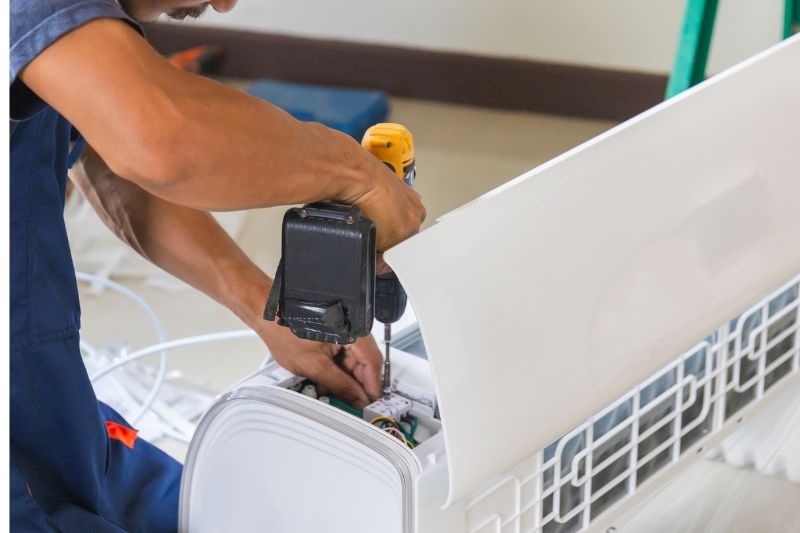
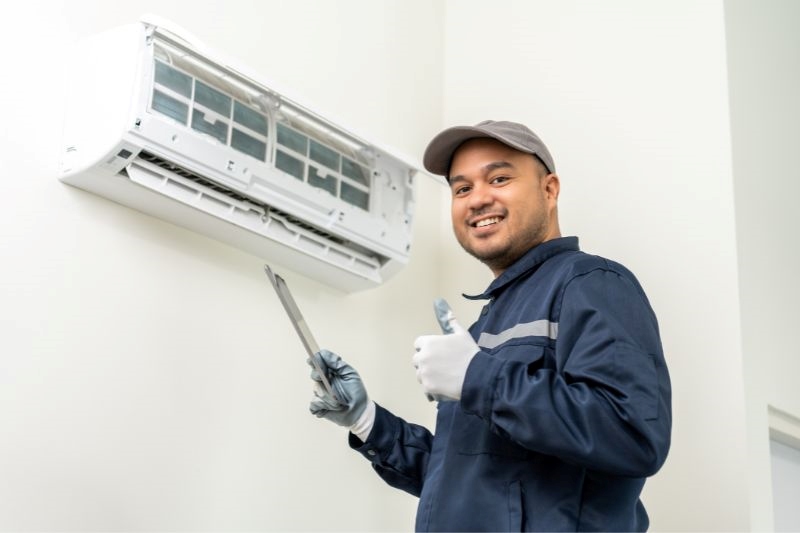
Got Questions? Call Now To Get Answers
How to Tell If Your Air Conditioner Needs Immediate Repair or a Simple Tune-Up
When it comes to your home’s comfort, few things are more essential than a functioning air conditioning system, especially during hot summer months. However, like any appliance, your air conditioner can experience issues from time to time. The challenge is knowing whether the problem requires immediate repair or if a simple tune-up will do the trick. Identifying the right course of action early can save you from more costly repairs down the line and keep your home comfortable.
Here’s how to tell whether your air conditioner needs an immediate repair or just a routine tune-up.
1. Strange Noises or Smells
If your air conditioner is making unusual noises—such as grinding, rattling, or squealing—it’s a strong indicator that something is wrong inside the unit. These sounds can be caused by a variety of issues, such as a worn-out belt, a loose part, or something obstructing the fan. In many cases, this requires immediate HVAC repair services to prevent further damage.
On the other hand, if your system is emitting unpleasant odors like a musty smell, it could be due to mold or dust buildup in the ducts or filter. While this might not be an emergency, it’s still best to have the unit checked by a professional for a simple tune-up to clear out any debris or mold.
2. Warm Air Coming from Vents
If you notice that the air coming from your vents is no longer cool, the issue could range from something simple, like a clogged filter, to more serious problems, like a refrigerant leak or a malfunctioning compressor. Heating and air conditioning repair near me can help diagnose the problem. In some cases, a residential heating repair expert may also identify issues that are preventing the air conditioner from performing as it should.
If you’re experiencing this problem on a hot day, it’s a good idea to call in an expert for immediate repair, as a complete lack of cooling could point to a larger issue that will require more extensive repairs.
3. Inconsistent or Weak Airflow
Inconsistent airflow can be a sign that your air conditioner is struggling to push air through your ducts properly. This could be a result of clogged filters, blocked ducts, or even a malfunctioning blower motor. A simple tune-up can often address airflow problems by cleaning the filters and ensuring everything is working properly.
However, if the airflow issue persists after the tune-up or if the system is only blowing weak air, it could indicate a more severe mechanical issue that requires heating and air conditioning repair services for a deeper fix.
4. Leaks or Water Pooling Around the Unit
An air conditioner that is leaking water or pooling water around the base is a red flag. This could be a result of a clogged drain line, a broken pump, or a refrigerant leak. While minor condensation may occur in the normal course of operation, large amounts of water around your unit are usually indicative of a larger issue that requires immediate repair.
In some cases, if the problem is caught early, a simple tune-up can resolve the issue. However, if the water is coming from refrigerant leaks or damaged components, immediate HVAC repair will be necessary to avoid serious damage to the unit.
5. System Not Turning On
If your air conditioner fails to turn on, it’s crucial to assess whether the issue lies with the thermostat, the circuit breaker, or the air conditioning unit itself. In many cases, an easy fix like adjusting the thermostat settings or resetting the breaker can resolve the issue. However, if these steps don’t work, you may be dealing with a more significant problem, such as a malfunctioning compressor or control board. This is a situation where immediate repair services are needed to avoid further damage to the system.
6. Increased Energy Bills
A sudden spike in your energy bills without a change in usage patterns can indicate that your air conditioner is working harder than usual to maintain the desired temperature. This could be due to a dirty filter, low refrigerant levels, or other mechanical issues that make the system inefficient. While this may not be an emergency, it’s wise to schedule an inspection and residential heating repair if necessary to prevent long-term damage.
A tune-up that includes cleaning filters, checking refrigerant levels, and ensuring the system is working efficiently can help lower energy consumption and prevent further wear and tear on your air conditioner.
7. The AC Unit Turns Off Unexpectedly
If your air conditioning unit starts cycling on and off frequently or unexpectedly shuts down, it may be a sign of an internal malfunction or a problem with the thermostat. This issue might be resolved with a tune-up if the thermostat needs recalibration or a quick fix. However, if the issue persists or the system doesn’t restart, you may need emergency HVAC repair to diagnose and repair the underlying issue.
8. No Response from Thermostat
When your thermostat isn’t responding to temperature changes or if the temperature readings are inaccurate, this can lead to improper cooling. While this can sometimes be an issue with the thermostat itself, it may also be a symptom of something more serious, such as a faulty sensor or wiring within your HVAC system. In such cases, it’s important to seek professional heating repair services to troubleshoot and repair any faulty components.
Conclusion
Recognizing whether your air conditioner requires immediate repair or just a simple tune-up can help prevent further damage and unnecessary expenses. Heating and air conditioning repair near me services are there to help identify and address these issues, whether they’re minor or major. Regular residential heating repair can also help ensure your HVAC system remains in good working condition, keeping your home comfortable year-round. If you notice any of the signs mentioned, don’t hesitate to contact a professional technician to assess your system and keep things running smoothly.
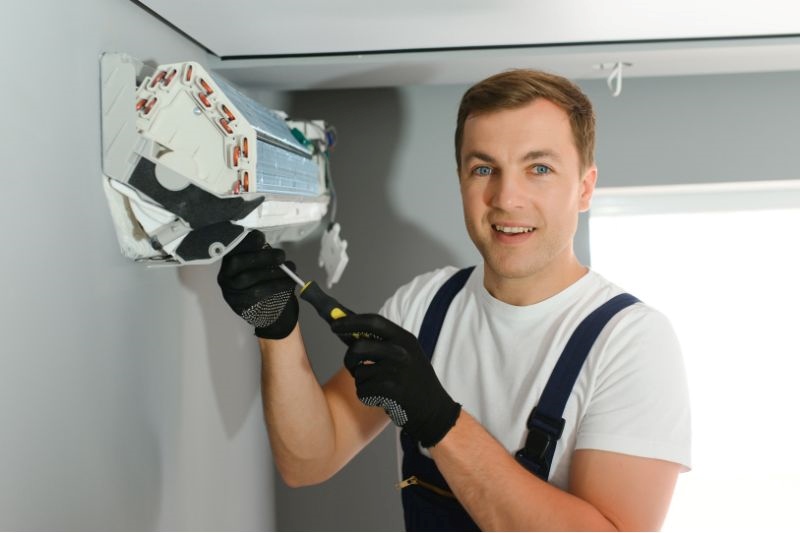

Got Questions? Call Now To Get Answers
What’s the Difference Between Residential and Commercial Air Conditioning Repairs?
Air conditioning systems are essential for maintaining comfort, whether in a home or a business. However, the repairs and maintenance for residential and commercial air conditioning units can vary significantly due to differences in size, complexity, usage, and needs. Understanding the differences between residential and commercial air conditioning repairs can help you make informed decisions when your AC system experiences problems. Let’s break down the key distinctions and what to expect from each type of service.
1. System Size and Complexity
One of the most obvious differences between residential and commercial air conditioning systems is their size and complexity.
– Residential air conditioning systems are typically smaller, designed to cool individual homes or small spaces. They often include split systems or central air units with less complex configurations. Due to their smaller scale, residential air conditioning repairs usually focus on issues like dirty filters, refrigerant leaks, or malfunctioning thermostats. These repairs are generally simpler and quicker to address.
– Commercial HVAC systems, on the other hand, are much larger and more complex, designed to cool larger buildings or multiple floors in office buildings, retail stores, and industrial facilities. Commercial HVAC repair involves more extensive systems, such as rooftop units (RTUs), chillers, or packaged systems. These systems have multiple components, and any repairs or maintenance may require a more in-depth understanding of industrial HVAC systems, as well as specialized tools and parts.
2. Usage and Wear
The level of wear on a system can also vary significantly based on its usage.
– Residential systems are typically used intermittently, especially in areas with moderate climates. They are often used during specific seasons or times of day, which means the wear and tear is less consistent.
– Commercial HVAC systems are used continuously throughout the day and night in most cases. High-traffic businesses such as retail stores, restaurants, and office buildings require their air conditioning to run non-stop. This constant usage leads to more wear on the system and often means that commercial HVAC systems require more frequent repairs and maintenance. They are also more likely to experience issues due to prolonged use under heavy loads.
3. Repair Costs
The cost of repairs can vary significantly between residential and commercial air conditioning systems due to differences in parts, labor, and the scope of work.
– Residential air conditioning repairs are generally less expensive because the systems are smaller and the problems are usually more straightforward. Common issues, such as refrigerant leaks or a malfunctioning capacitor, can often be fixed quickly without requiring extensive labor or expensive parts.
– Commercial HVAC repair, however, tends to be more expensive because of the larger scale of the systems and the complexity of the work. Commercial units often require specialized technicians who are trained in working with complex systems. Additionally, the cost of replacing parts for commercial units can be higher, and the repair process may involve extended downtime, which can disrupt business operations.
4. Response Time and Availability
The urgency of HVAC repairs can also differ between residential and commercial settings.
– Residential air conditioning repair typically does not require immediate action unless it’s a particularly hot day or the system fails during a crucial time. Homeowners may be able to wait a day or two for a technician to arrive, and depending on the problem, they may even be able to use temporary cooling options like fans or portable AC units.
– Commercial HVAC repair requires a much faster response time. Businesses can’t afford to have their HVAC system out of commission, especially during hot summer months or in environments where climate control is essential for employee productivity, customer comfort, or even food safety. Many commercial HVAC repair services offer 24/7 emergency service to address these urgent needs promptly.
5. Maintenance Needs
Regular maintenance is essential to avoid costly repairs and system failure in both residential and commercial settings. However, the frequency and scope of maintenance vary.
– Residential air conditioning systems typically require basic maintenance, such as changing filters, checking refrigerant levels, and cleaning coils. Homeowners can usually handle minor tasks themselves, with professional help needed for more complicated issues like refrigerant recharging or motor replacements.
– Commercial HVAC systems require more frequent and extensive maintenance due to their size and constant use. Commercial HVAC repair services are typically performed by specialists who conduct detailed inspections, clean large units, check for airflow obstructions, replace filters, and address any worn-out parts. Because of the larger system size, commercial maintenance often requires more time and specialized equipment.
6. System Lifespan
The lifespan of an air conditioning system varies between residential and commercial systems, influenced by the level of use and maintenance.
– Residential air conditioners tend to last between 10 to 15 years, depending on the quality of the system and how well it’s maintained. Regular repairs and tune-ups can extend the lifespan, but residential systems generally wear out more slowly compared to their commercial counterparts.
– Commercial HVAC systems, being in use much more often and under more strain, typically have a shorter lifespan. They may last anywhere from 10 to 15 years, but because they endure constant use, they may need more frequent repairs and part replacements. Well-maintained commercial systems can still operate efficiently for many years, but they require proactive maintenance to ensure optimal performance.
Conclusion
When it comes to air conditioning repairs, residential and commercial HVAC systems serve different purposes and face different challenges. While both types of systems may require similar types of repairs, commercial HVAC systems tend to be more complex, costlier to repair, and in need of more frequent, specialized attention. Whether you need simple repairs for your home’s cooling system or urgent service for your business, understanding the differences between residential and commercial repairs can help you make the right choice for your needs. If you’re a business owner, it’s important to work with experienced commercial HVAC repair services to ensure your system remains functional and energy-efficient, keeping your space cool and your operations running smoothly.
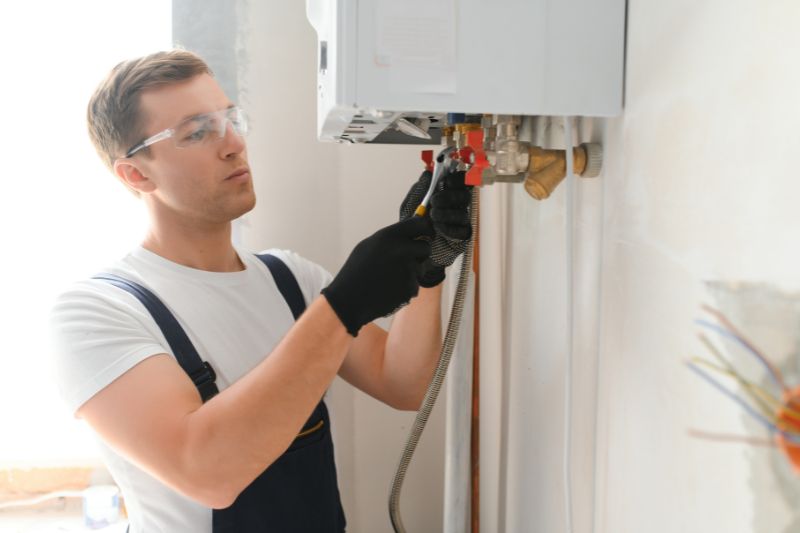
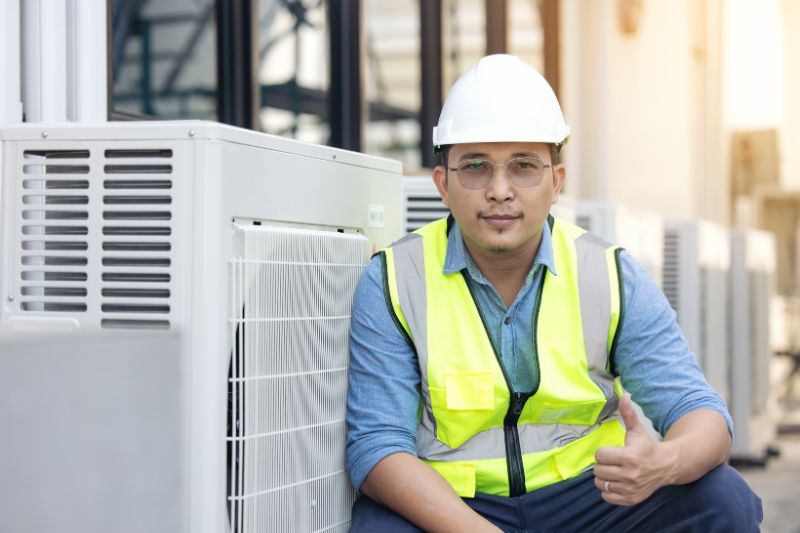
Got Questions? Call Now To Get Answers
Understanding the Cost of Air Conditioning Repairs: What You’re Paying
When your air conditioner starts malfunctioning, one of the first concerns is often the cost of repairs. Air conditioning systems, whether residential or commercial, are complex machines that require skilled technicians to diagnose and fix problems. However, the price of an air conditioning repair can vary widely depending on several factors. Understanding the breakdown of these costs can help you make informed decisions when you face AC repair needs. Here’s an overview of what you’re typically paying for when you schedule air conditioning repairs.
1. Diagnostic Fees
Before any repairs can begin, a technician must identify the problem with your air conditioning unit. This process is called diagnostic testing, and the cost of this service is usually one of the first charges you’ll encounter.
– Diagnostic fees cover the technician’s time and expertise to inspect and troubleshoot your system. During this visit, the technician may run tests, check the refrigerant levels, assess airflow, or use special tools to pinpoint the exact issue.
– On average, diagnostic fees can range from $50 to $150, though some companies may waive the fee if you choose to proceed with the repair services they recommend.
2. Labor Costs
Labor costs are a significant portion of the overall repair bill. The amount you pay for labor depends on the severity of the repair, the complexity of the issue, and how long the technician needs to work on your system.
– Hourly labor charges can range from $50 to $150 per hour, with rates varying by location, the technician’s experience, and the company. Some companies may also charge a flat rate for specific types of repairs or maintenance services.
– Labor costs increase if the repair is more involved, such as replacing a compressor or repairing a leak in the refrigerant line. If a system requires multiple visits or additional time to access hard-to-reach components, this could further raise the labor costs.
3. Parts and Materials
When air conditioning systems fail, it’s often due to faulty components that need replacing. Common parts that may require repair or replacement include:
– Compressor: The compressor is essential for circulating refrigerant in the system. If it fails, you may face a high repair cost, as compressors can be expensive (anywhere from $400 to $1,500, depending on the model).
– Evaporator coils: These coils are responsible for absorbing heat from the air. If they are damaged or corroded, they will need replacing, which can cost between $300 to $1,200.
– Condenser coils: These coils release the heat absorbed by the evaporator coils. Replacement costs for condenser coils generally range from $200 to $1,500, depending on the system.
– Refrigerant: If your system is low on refrigerant due to a leak, the technician will need to refill it. The cost of refrigerant depends on the type and how much is needed. Prices can range from $100 to $400, depending on the system’s refrigerant needs.
– Capacitors and capacitors: These small components help power the motor and fan. Replacing a faulty capacitor is relatively inexpensive, usually ranging from $100 to $400.
In some cases, the repair may involve replacing multiple parts or repairing an area of the system that requires specialty parts, which will add to the overall cost.
4. Type of Repair
The cost of your air conditioning repair is also influenced by the type of issue your system is experiencing. Some problems are simple and inexpensive to fix, while others require more extensive work and expensive components. Here are some common AC repairs and their typical costs:
– Refrigerant leak: If your AC has a refrigerant leak, fixing it usually involves repairing the leak and recharging the system with refrigerant. This can cost between $200 to $1,500 depending on the severity of the leak and the type of refrigerant.
– Thermostat issues: If your thermostat isn’t functioning correctly, it may need to be recalibrated or replaced. A simple recalibration might cost as little as $75 to $150, while a full replacement could run between $150 to $300.
– Frozen coils: If your air conditioner’s coils are frozen, it can be caused by issues like poor airflow or low refrigerant levels. The repair might involve fixing the airflow or replacing the refrigerant, which can cost between $150 to $1,200.
– Clogged or dirty filters: Clogged filters are a common cause of reduced efficiency. Replacing or cleaning a filter is a relatively inexpensive repair, generally costing between $20 to $75.
– Broken fans or motors: If the fan or motor is faulty, the repair cost can vary widely, ranging from $150 to $600 depending on the specific part that needs replacing.
5. Emergency or After-Hours Charges
If your air conditioner breaks down in the middle of a hot summer night or during a holiday weekend, you may need emergency HVAC repair services. Emergency repair calls often come with an additional fee due to the time of service.
– Emergency HVAC repair can cost anywhere from 1.5x to 2x the standard hourly rate, depending on the time and day of the repair. After-hours fees for emergency service typically add an additional $100 to $300 to the total bill.
– If you require an emergency visit during peak seasons (such as summer), the cost may be higher, as HVAC technicians may be in high demand.
6. Maintenance Plans and Warranties
Some HVAC companies offer maintenance plans or warranties that can help mitigate repair costs down the line.
– Maintenance plans often include regular check-ups, such as cleaning coils, replacing filters, and checking refrigerant levels. Signing up for a maintenance plan can cost anywhere from $150 to $500 annually, but it can help prevent larger, more expensive repairs in the future by keeping your system running efficiently.
– Warranties may cover certain repairs or replacement parts, depending on the manufacturer and the system’s age. If your AC is still under warranty, you may only need to pay for labor and diagnostic fees, which can significantly reduce repair costs.
7. System Age and Efficiency
Finally, the age and efficiency of your air conditioning system can play a role in how much repairs will cost.
– Older systems may have outdated or hard-to-find parts, making repairs more expensive. Additionally, older units tend to break down more often, leading to higher cumulative repair costs over time.
– Newer, more energy-efficient systems may have parts that are still under warranty and may require fewer repairs, saving you money in the long run.
Conclusion
The cost of air conditioning repairs can vary depending on the complexity of the problem, the parts that need replacing, and the time of service. On average, AC repairs can range from $100 to $2,000, with diagnostic fees, labor, and parts contributing to the overall cost. By staying on top of regular maintenance and addressing issues early, you can minimize the likelihood of expensive repairs and extend the life of your air conditioning system. Understanding the breakdown of repair costs can help you make an informed decision when facing AC issues, ensuring that you receive fair pricing for the necessary repairs and services.
Got Questions? Call Now To Get Answers
Reach Us
Heating and Air Conditioning Repair – Atlanta, GA
(404) 348-2709
Hours of Operation
Mon Open 24 hours
Tue Open 24 hours
Wed Open 24 hours
Thu Open 24 hours
Fri Open 24 hours
